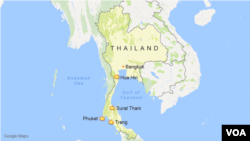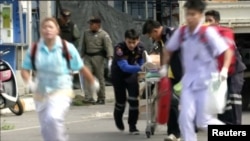A week after bombings in southern Thailand’s prime tourist locations killed four people and wounded dozens of others, the tourism industry hopes for quick rebound.
A string of explosions and arson attacks, beginning late August 11 and into the next morning, rattled popular beach resort areas including Hua Hin, where the Thai royal family has a residence. Other targets included the provinces of Phuket – with almost 30 million visitors in 2015 – Surat Thani, Phangna, Trang, Chumphon and Nakhon Si Thammarat.
Lisa Onghang, president of the Hua Hin Cha Am Tourism Association, said a sense of normalcy has returned to the region after the initial shock.
"When it happened, Thai people feel afraid so there was cancellations by some Thais – but not from abroad," she said. "… I have many emails from our clients who seem to understand. So now the situation in Hua Hin has come back to normal."
But economists at the University of the Thai Chamber of Commerce say the attacks may deter as many as 365,000 visitors, triggering as much as $170 million in revenue losses. And analysts say any further violence would have a deeper impact on an industry considered a cornerstone of the Thai economy.
More than 33 million visitor arrivals were forecast for 2016, with almost a third from China.
The World Travel and Tourism Council says Thailand’s tourism generates $72 billion annually. It creates jobs – directly or indirectly – for about 5 million people, accounting for over 14 percent of total employment.
Earlier setback
Thailand’s tourism industry suffered a dramatic 20 percent slide after the August 2015 bombing of a Hindu shrine in Bangkok left 20 people dead and more than 120 wounded. Many were from Asia.
Visitor numbers dropped sharply in the last quarter of 2015, with recovery only evident with the new year.
Sukanya Jandoo, vice president of the Thai Hotels Association and general manager of the Dusit Thani Bangkok, said the recent bombings have brought fewer cancellations than after last summer’s attack.
"It was nowhere near the magnitude of the previous tragic event. In terms of business impact," Sukanya said. "I would say that city and provinces where the attack took place have been more affected than the others."
Who’s behind attacks?
Thai authorities have arrested two men and on Friday issued a warrant for a third. According to the Associated Press, a police spokesman said the suspect comes from Narathiwat, a southern province where a Muslim separatist insurgency took hold in 2005.
Uncertainties about who’s behind the attack have led to fears of further violence, said economist Somphob Manarangsan.
"It depends on whether it’s going to happen again," Somphob said. "I think if it is only one incident and no more like that, I don’t think it’s going to have a big impact to the Thai economy, particularly the business sector."
But he said a key concern is whether the bombings mark renewed political violence in Thailand.
The attacks came days after voters in a national referendum approved a new military-supported constitution that is expected to increase the military’s influence in the next elected parliament.
Other analysts have tied the attacks to Thailand’s Muslim insurgency in the southernmost border provinces with Malaysia amid a slow pace in peace talks with the military government.
Vote of confidence
Pornthip Hirunkate, vice president of the Tourism Council of Thailand, said the industry has called on the government to step up security at tourist-related sites such as airports and hotels to prevent a repeat of the attacks.
“We have to be alert and prepared if anything happens,” Pornthip said.
The Thai tourism industry received a vote of confidence after the United Nations World Tourism Organization (UNWTO) said it was pressing ahead with a September 27 event in Bangkok to mark World Tourism Day.
The Dusit Thani’s Sukanya remains upbeat about tourism because of “the Thai government attempting to restore foreigners’ confidence and also woo visitors back with increased security measures, promotion campaigns and also every citizen lending a hand in this effort to keep [tourists] coming.”






